Leibniz Supercomputing Center

Profile: The Leibniz Supercomputing Centre (LRZ) of the Bavarian Academy of Sciences and Humanities (BADW) is the IT service provider for Munich’s universities and a growing number of scientific institutions in the greater Munich area and in the state of Bavaria. The LRZ was founded in 1962 in Munich and is now located on the Research Campus in Garching. It supports outstanding research and education in various scientific domains by providing stable, professional, reliable, secure, and energy efficient IT services based on the latest IT technologies. The competencies of about 200 employees are well grounded on many years of extensive operational experience, research on latest IT topics, as well as close cooperation with manufacturers and scientific clients. The Centre is a front-runner nationally and internationally in High-Performance Computing (HPC). It is a member of the German national supercomputing initiative Gauss Centre for Supercomputing (GCS), the European PRACE network, the EuroHPC initiative and the German Smart Exascale initiative. It hosts SuperMUC phase 1 and Phase 2, two PRACE Tier-0 systems with 3.2 and 3.6 PFlop/s, respectively. By the end of 2018, SuperMUC-NG will be installed at BADW-LRZ, a machine with 26.7 PFlop/s peak, and an expected LINPACK performance of 20,4 PFlop/s. SuperMUC-NG, high-capacity, flexible and energy efficient, will be the ”Next Generation” to the current SuperMUC. It will be equipped with more than 6.400 Lenovo ThinkSystem SD650 DWC compute nodes based on the Intel Xeon Scalable processor. This will mean more than 300,000 compute cores that will provide an impressive computational power of 26.7 PFlop/s to be used for a wide-range of scientific computations. Furthermore, BADW-LRZ hosts several Bavarian HPC clusters with roughly 20,000 compute cores, as well as a compute cloud and other computing systems.
BADW-LRZ supports the adoption of appropriate algorithms to its supercomputer architectures and actively conducts research in the field of HPC within its own work groups and through collaborations with the Bavarian Competence Network for Technical and Scientific High Performance Computing (KONWIHR) as well as the Munich Computational Sciences Centre (MCSC) – a collaboration of the Technische Universit¨at M¨unchen (TUM), the Ludwig-Maximilians-Universit¨at (LMU), the Max-Planck Society and its High Performance Computing Centre (MPG-RZG). BADW-LRZ is operating a Tier-2 centre for the Large Hadron Collider Computing Grid within the LCG-Project and is a central site for large-scale data archiving and backup.
In addition to HPC systems and applications, the BADW-LRZ has longstanding and internationally wellknown expertise in IT security, network technologies, IT management, IT operations, big data management and archiving, as well as grid and cloud computing. All IT-related staff members of BADW-LRZ are ISO20000 certified on foundation level at minimum to ensure a high quality in IT service management. Furthermore, BADW-LRZ is involved in a committee defining parts of the ISO20000 standard. In this role, BADW-LRZ has been participating in the ITSM-related EU projects gSLM and FedSM. Furthermore, the BADW-LRZ operates a powerful communication infrastructure called Munich Scientific Network (MWN) representing the competence centre for high-speed data communication networks. MWN connects all research institutions in the greater Munich area with nearly 70.000 systems and 120.000 users. Expertise in big data technologies and machine learning of BADW-LRZ staff is employed under the umbrella of recently created Bavarian Big Data Competence Centre at BADW-LRZ.
BADW-LRZ focuses on energy-efficient computing; it has been awarded several times of its green approach: e.g., the “Deutsche Rechenzentrumspreis 2012“, in the category ”Energy and resource efficient computing centres”. It was strongly involved in the research projects which were awarded the PRACE Award in 2013 and 2014, the latter also being accepted for the finalist round of the Gordon Bell Prize 2014. BADW-LRZ plays the essential role in the DFG-funded Generic Research Data Infrastructure project (GeRDI). GeRDI connects existing and future research data centres in order to support the findability, accessibility, interoperability and reusability (FAIR) of research data across all research disciplines. Furthermore, BADWL-LRZ is a member of the ”Munich Data Science Centre”, that provides to the scientific community large-scale data archiving resources, Big Data technologies and Cloud solutions.
Within the framework of a partnership initiative in Computational Science ”pCS”, BADW-LRZ initiates collaboration with researchers from specific scientific fields for creation and development of innovative services. This initiative, which is currently concentrating on the focus domains of astrophysics, life sciences, geo- and environmental sciences, as well as the topic of energy efficiency and resource saving, is opening new avenues of cooperation between computer scientists, IT service providers, and domain scientists.
Expertise and Role in CONCORDIA: LRZ will provide the necessary instrastructure for implementing CONCORDIA cybersecurity cloud services and features as those are dictated by the Description of Action. LRZ will also lead WP2 and will supervise the various pilot use cases realization.
Links: Leibniz Supercomputing Center
